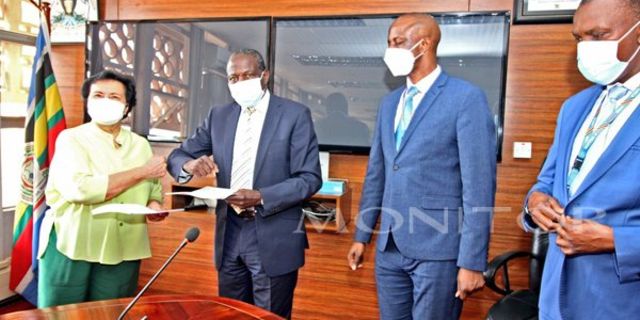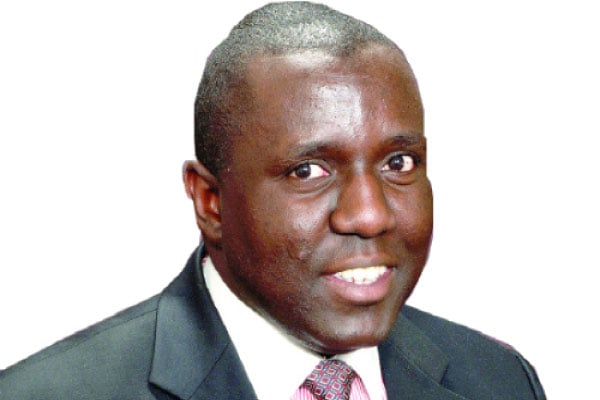Prime
Weighing the coffee deal freebies, gains

Finance minister Matia Kasaija (2nd left) exchanges documents with Ms Enrica Pinetti (right) after signing an agreement with the Finance ministry to establish a coffee processing plant in Uganda, on February 10. PHOTO / FILE
What you need to know:
- Our analysis of the MoU shows that the coffee firm is expected to invest $80m (Shs283b), produce 27,000 tonnes of roasted coffee beans, among others.
The government has set a raft of targets for Uganda Vinci Coffee Company (UVCC) to achieve in exchange for what critics, including Parliament, have called more than generous sweeteners offered in a memorandum of understanding.
Finance Minister Matia Kasaija, who signed the deal with the firm owned by Italian investor Enrica Pinetti, face rough questioning by Parliament’s Committee on Trade on Wednesday, this week, a day after irate members of the ruling party’s Parliamentary Caucus beat back President Museveni’s combative defence of the MoU.
The multiple incentives in the contract to an investor who is under scrutiny for failing to build a specialised hospital of land donated by the government which in addition provides a promissory note in excess of Shs300b, has ranged coffee farmers, processors, some ministers and members of Parliament against mainly the Executive.
Amid growing condemnation of the deal in public discourses, President Museveni summoned lawmakers subscribing to National Resistance Movement (NRM) party to, among others, explain the MoU, only to be met by a hostile audience.
After hours of talk but no progress, Mr Museveni capitulated to the demands of the legislators, but Attorney General Kiryowa Kiwanuka, in comments restricted to the law, said he saw no wrong with the deal with UVCC unless the provisions are being misunderstood or misinterpreted.
Like the President, the AG argues that the caveat and takeaway from the MoU is cut out: increased value-addition that fetches Uganda higher forex exchange.
Our analysis of the MoU shows that the coffee firm is expected to invest $80m (Shs283b), produce 27,000 tonnes of roasted coffee beans, ground coffee, instant spray dried coffee, coffee capsules and complementary product a year from start, increasing to 60,000 tonnes in 5th year.
UVCC is also under obligation to employ at least 246 Ugandans, buy coffee at competitively global prices, and generate $670m (Shs2.4 rillion) in forex exchange.
In exchange, the coffee investor has been offered multiple incentives, among them, free and serviced 25 acres of land in Namanve Industrial Park valued at $2m (Shs7.1b), and cheaper electricity tariffs, capped at no more than $0.5 cents, for a decade.
Other benefits alongside a caveat that the government won’t revoke any commitments while ensuring the investor’s applications are fast-tracked at minimal costs, include multiple tax waivers.
The MoU provides that the coffee firm will not pay import duty, stamp duty, excise duty, Value-Addition Tax (VAT), Pay As You Earn levy, local service tax, for work permits, or contribute on behalf of its employee to the National Social Security Fund (NSSF).
These offers to a foreign investor, which AG Kiryowa said are also available to Ugandan entrepreneurs, has been met in Parliament and outside, including in Buganda and Bugisu, two regions that lead in producing most of Uganda’s coffee, with anger and disbelief.
DON'T MISS: Who’s that girl? Peeling mask on Enrica Pinetti
A provision to grant UVCC near first right to buy, or refuse to buy, any of Uganda’s coffee led to some minister in a meeting last week chaired by Prime Minister Robinah Nabbanja, to question how it would be enforced or what the government would do if growers refuse to sell their produce to Ms Pinetti’s company.
Uganda Law Society (ULS), civil society groups have voiced their disapproval in addition to misgivings by local sector players that the coffee deal amounted to the state establishing a monopoly in a country whose official economic policy is liberalisation.
Minister Kasaija told Parliament’s Committee that has investigated the matter, and is due to table its report, that the coffee deal is good for Uganda.
Kasaija said all the crop of current foreign players in Uganda’s coffee sector are only interested in taking coffee beans to their home countries cheaply instead of processing it here as UVCC plans to do.
He said despite Uganda being one of the world’s biggest coffee producers, its footprint at high-end products is negligible. He attributed this to the coffee roasting and packaging market being dominated by manufacturers in major coffee-importing countries such as Switzerland, Italy, Germany, France, The Netherlands and the United States.
“The coffee export business in Uganda is dominated by multinational enterprises whose primary goal is to provide coffee beans to their headquarters and not to serve the best interests of Uganda. These multinational companies control over 70 percent of Uganda’s coffee export business,” he said.
He said while Ugandans are crying over the tax incentives offered to Vinci, other countries in the EAC are attracting more investors in the coffee sector to add value to their coffee.
“For example, Ethiopia provides tax holidays for priority sectors including agro-processing, and textiles, among others. Other EAC countries equally have investment opportunities in coffee processing and intend to attract foreign investors through their generous incentive schemes, which makes the support for the Uganda Vinci and others similar investments necessary,” the minister added.
Coffee deal
Incentives
1. Free land valued at Shs7.3b
2. Tax exemptions for 10 years
including import duty, VAT, PAYE, local service tax, work permits, NSSF, stamp duty, excise duty.
3. First right to buy Uganda coffee.
4. Cheaper direct power supply, at 5 cents per unit, for a decade
5. Government to relocate overhead transmission lines passing over or above the land belonging to the Company at its own cost.
6. Build road to link plant and main road.
7. No revocation of granted consent, minimum cost for processing company business applications.
Deliverables
1. Coffee firm to invest Shs283b ($80m).
2. Produce 27,000 tonnes a year from start, increasing to 60,000 tonnes in 5th years.
Include among products roasted coffee beans, ground coffee, instant spray dried coffee, coffee capsules and complementary product.
4. Employ 246 Ugandans
5. Buy coffee at competitively global prices.
6. Generate $670m (Shs2.4 rillion) in forex exchange.




